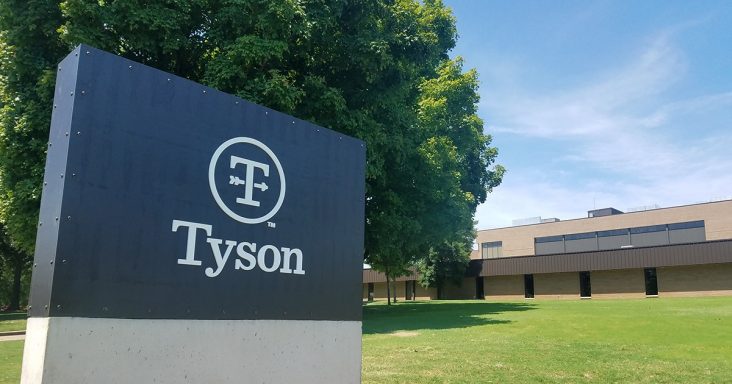Tyson shareholders to convene in Springdale, mark 88 years
by February 1, 2023 4:53 pm 1,729 views

Tyson Foods will hold its annual shareholder meeting at 10 a.m., Feb. 9 at the company’s offices on Emma Street in downtown Springdale. It is the company’s 88th year, dating back to the mid-1930s, and the 75th year since its incorporation in 1947.
During the business meeting, shareholders will vote to elect a slate of 13 directors to a one-year term, approve three company proposals dealing with executive pay, and ratify PwC as the company’s independent public accounting firm for fiscal 2023.
One shareholder proposal will be brought by The Shareholder Commons (TSC), a nonprofit focusing on social and environmental issues that often conflict with company strategies to improve profits.
TCS asks that Tyson Foods comply with the expert guidelines on antimicrobial use in meat supply chains to help stop the overuse of antibiotics. TSC believes the overuse of antibiotics in animal husbandry creates antimicrobial resistance, which can have grave implications for humans. The group said there is a growing body of evidence that shows there is antimicrobial-resistant bacteria arising from farming communities and transferring to human populations.
TSC praised Tyson for reducing the use of antibiotics in its chicken supply chains but more needs to be done in the overall meat supply chains involving pork, turkey and beef. The group asked Tyson Foods to comply with the World Health Organization’s guidelines on using antimicrobials in food-producing animals.
Tyson Foods management does not support the TSC proposal saying the board carefully considered the proposal and, given its existing work on antibiotic stewardship, believes a new policy and compliance program is unnecessary. Tyson said it already has instituted a policy that uses the WHO’s non-binding guidelines on using antibiotics, antivirals, antifungals and antiparasitics.
Tyson Foods’ dual-class share system gives the Tyson family a controlling majority of the voting shares with 70 million Class B shares which carry a 10-1 voting advantage over the 287,815,821 shares of Class A stock publicly owned and traded as of the close of business on Dec. 12. Historically, any proposal not approved by the board does not pass given the Tyson family of which board chairman John H. Tyson is a beneficiary can block the vote with the Class B share advantage.
Three of the board-approved proposals deal with executive pay with regard to how often shareholders will have a say on officer pay as well as a say in the frequency of reporting the officer pay. The board asks shareholders to vote every three years, but they can choose from 1-and-2-year options or abstain from voting on the compensation of company executives and officers. Also, shareholders will be asked to approve the amendment and restatement of Tyson’s 2000 Stock Incentive Plan for executives.
The Proxy filing also outlined the increased base retainer fees paid to directors effective August 2022. Base retainer pay was raised from $105,000 to $115,000, and the deferred stock compensation stock award value was raised from $160,000 to $175,000. Tyson also adjusted the pay for the lead independent director and the vice chairman from $125,000 to $180,000 and raised the stipend pay for the audit committee chairman by $5,000.
Following is Tyson’s slate of directors seeking one-year board seats:
John H. Tyson, 69, chairman and grandson of the founder
Les Baldrige, 65, independent director since 2020
former Arkansas Gov. Mike Beebe, 75, independent director since 2015
Maria Claudia Borras, 53, independent director since 2021
Mikel Duham, 59, independent director since 2015
Donnie King, 60, CEO of Tyson Foods
Jonathan Mariner, 68, independent director since 2019
Kevin McNamara, 66, independent director since 2007
Cheryl Miller, 50, independent director since 2016
Jeffery Schomburger, 60, independent director since 2016
Barbara Tyson, 73, aunt of John Tyson and director since 1988
Noel White, 64, vice chairman since 2020, director since 2018
